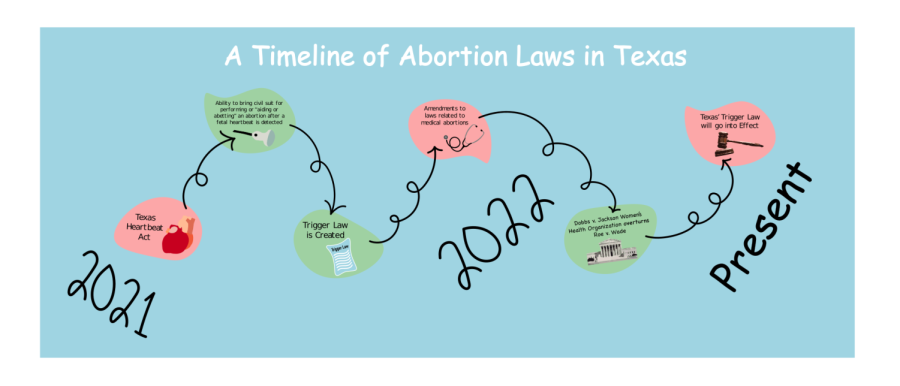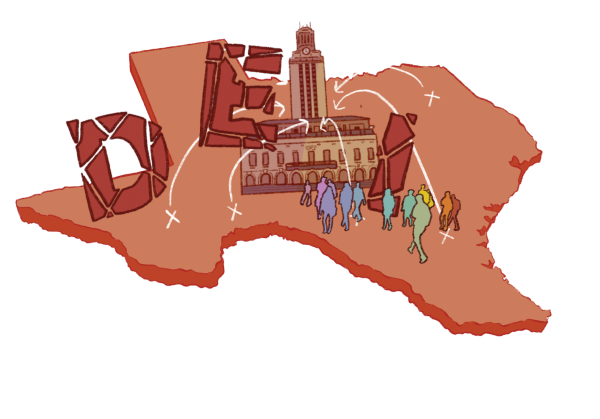Confusion as Abortion Guidelines Change
March 6, 2023
For the 49 years, from 1973 to 2022, the constitutional right to an abortion was indisputable due to the Roe v. Wade decision. However, on June 24, 2022, the Dobbs v. Jackson Women’s Health Organization decision overturned the original Roe case, leaving legislation on abortions up to individual states.
Many states, like Texas, had already created “trigger laws” in preparation for Roe v. Wade’s overturning. Trigger laws are laws decided by a legislative body, but are only put into place once a certain thing happens, in this case once Dobbs was decided, several states outlawed abortion. Currently, in Alabama, Arkansas, Florida, Kentucky, Louisiana, Missouri, Oklahoma, Ohio, South Dakota, Tennessee or Texas abortion is banned with no exceptions for rape or incest, according to the New York Times.
According to Dr. Margaret Kini, a family doctor and women’s health provider at Community Care, abortion restrictions in Texas have been around far longer than the Dobbs decision. Many of these older restrictions worked towards pushing doctors away from performing abortions.
“Cap laws are targeted restrictions on abortion providers that have been in the state of Texas since 2003,” Kini said. “They’ve forced clinics to close and had a devastating impact…the bills target specifically abortion providers and enact medically unnecessary but politically motivated regulations under the guise of protecting the safety of women.”
Abortions have been used as a political tool since the mid-1970s. According to an article from CNN, before Roe v. Wade, and even shortly after, abortion was a very bipartisan issue, with many Democratic, as well as Republican, leaders spearheading the anti-abortion movement, as both largely represented Catholic communities that were known to be anti-abortion.
Despite historic sentiments, currently, 61 percent of Americans agree that abortion should be legal, according to a survey from Pew Research. Jess Pires-Jaconse is the Organizing and Outreach Manager of Avow Texas, a non-profit fighting for unrestricted access to abortion for all Texans. She said most Americans are in support of safe and legal access to abortions.
“National polling consistently shows that the majority of Americans support abortion access and oppose politicians interfering with their healthcare decision,” Pires-Jancose said. “Unfortunately, decades of gerrymandering and voting restrictions across the country has created a political system in which our elected officials often do not represent our views as community members.”
Furthermore, The New York Times found that only 16 of the 50 United States have fully unrestricted abortion access, despite the 61 percent of Americans who believe abortions should be legal. Studies by NBC have shown that abortion has become an incredibly partisan issue in the U.S., with the Republican party promoting anti-abortion legislation, and the Democratic party trying to uphold abortion access.
Sarah Wheat is the Chief External Affairs Officer at Planned Parenthood of Greater Texas. She said most data supports the narrative that Americans approve of abortion access.
“Polls show that the majority of Americans believe that abortions should be legal,” Wheat said. “Yet some politicians continue to promote bills that would add additional penalties and bans on abortion.”
Although there is a significant amount of words used within each bill, the Texas laws regarding abortion are clear. Abortion is illegal in all circumstances with no exception for rape or incest. However, the law does not prevent people from partaking in illegal and unsafe abortions, according to Wheat.
“Under Texas’ statewide abortion ban,” Wheat said. “Texans can’t access an abortion from a medical doctor trained to provide abortion services.”
Contradicting Texas’s laws, the U.S. Food and Drug Administration (FDA) now allows the first of two drugs offering a prescribed abortion to be sold at retail pharmacies, like CVS, if they follow specific regulations. One of the drugs, Mifepristone, works by blocking the production of progesterone, which is necessary for a fetus to grow. Progesterone is also necessary for cancers to grow, and mifepristone is often used as a cancer treatment.
“Surgeon oncologists felt that their restrictions were actually limiting this safe and effective medication, [mifepristone,] and causing delays in people getting the care they need,” Kini said. “So it does still require a prescription. It’s not available over the counter, and there are still some unnecessary obstacles to prescribing it and dispensing it such as special certification for the pharmacy provider.”
The FDA first approved mifepristone in 2000, and its safety has rarely been questioned medically. In a prescribed abortion, mifepristone is taken first and then supplemented by misoprostol, which is used to prevent stomach ulcers and protect stomach lining.
“Mifepristone was approved by the FDA more than 20 years ago,” Wheat said. “[Mifepristone] has been used by more than 5 million people to safely end their pregnancies since then.”
The selling of mifepristone at retail pharmacies raises many questions about what that means for Texans, as abortion is still completely illegal. Pires-Jaconse says the constant change around abortion laws only complicates matters.
“It is important for Texans to know their rights,” Pires-Jaconse said, “because oftentimes even healthcare providers, police, and district attorneys are misinformed on protections for pregnant people due to the strength of anti-abortion stigma and confusing nature of abortion restrictions.”
Unlike performing one, receiving an abortion is not criminalized in Texas, and the state is explicitly banned from prosecuting a pregnant person for seeking an abortion. However, this law seems to not be as enforced as heavily the outlawing of abortion itself.
“Under Texas law, a pregnant person cannot be prosecuted for their pregnancy outcomes, however, the risk of criminalization does not fall equally across all Texans,” Pires-Jaconse said. “We have seen cases of Black and brown Texans being jailed for suspected abortion attempts.”
Because abortion bans cause an uneven impact on various social groups, understanding the legislation is important according to Pires-Jaconse. Additionally, Kini says making abortions illegal only widens economic and racial disparities.
“[The] criminalization of abortion doesn’t stop women from having abortions, it only increases risks for people, and there are clear disparities in those risks,” Kini said. “So while abortion bans and all these legal restrictions harm people who are or maybe are pregnant, they cause even greater harm to those already affected by things like systemic racism and economic injustice.”










